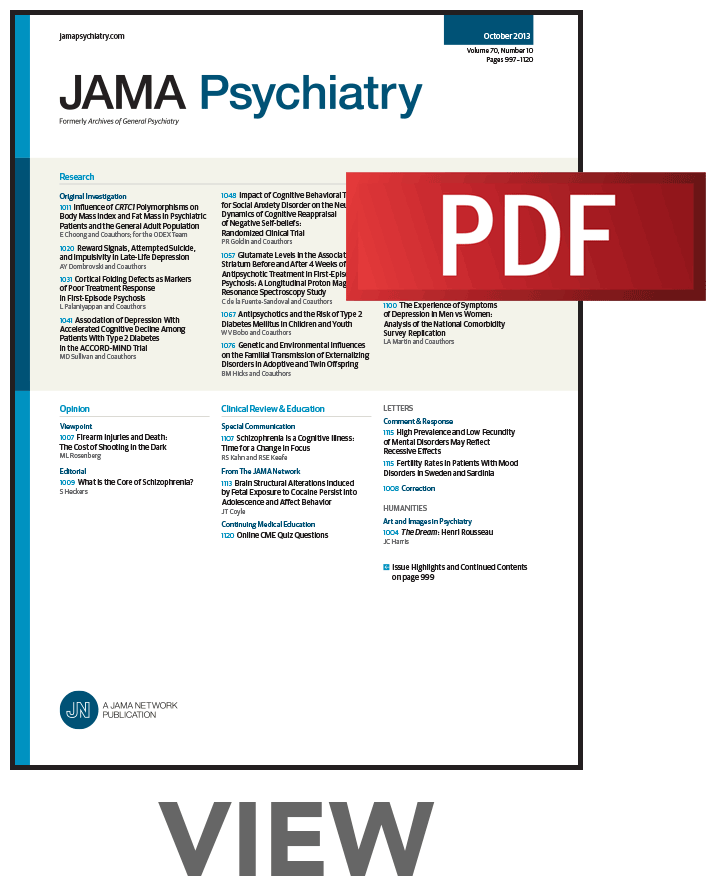由肠道微生物组改变介导的软饮料消费和抑郁。
IF 17.1
1区 医学
Q1 PSYCHIATRY
引用次数: 0
摘要
软饮料消费与负面的身心健康结果有关,但其与重度抑郁症(MDD)的关系及其潜在机制尚不清楚。目的探讨软饮料消费与重度抑郁症的诊断和严重程度之间的关系,以及这种关系是否与肠道微生物群的变化有关,尤其是蛋菌和亨盖特菌的丰度。设计、环境和参与者这项多中心队列研究在德国进行,使用来自marburg - m本文章由计算机程序翻译,如有差异,请以英文原文为准。
Soft Drink Consumption and Depression Mediated by Gut Microbiome Alterations.
Importance
Soft drink consumption is linked to negative physical and mental health outcomes, but its association with major depressive disorder (MDD) and the underlying mechanisms remains unclear.
Objective
To examine the association between soft drink consumption and MDD diagnosis and severity and whether this association is mediated by changes in the gut microbiota, particularly Eggerthella and Hungatella abundance.
Design, Setting, and Participants
This multicenter cohort study was conducted in Germany using cross-sectional data from the Marburg-Münster Affective Cohort. Patients with MDD and healthy controls (aged 18-65 years) recruited from the general population and primary care between September 2014 and September 2018 were analyzed. Data analyses were conducted between May and December 2024.
Main Outcomes and Measures
Primary analyses included multivariable regression and analysis of variance (ANOVA) models examining the association between soft drink consumption and MDD diagnosis and symptom severity, controlling for site and education, and Eggerthella and Hungatella abundance, controlling for site, education, and library size. Mediation analyses tested whether microbiota abundance mediated the soft drink-MDD link.
Results
A total of 405 patients with MDD (275 female patients [67.9%]; mean [SD] age, 36.37 [13.33] years) and 527 healthy controls (345 female controls [65.5%]; mean [SD] age, 35.33 [13.13] years) were included. Soft drink consumption predicted MDD diagnosis (odds ratio [OR], 1.081; 95% CI, 1.008-1.159; P = .03) and symptom severity (P < .001; partial η2 [ηp2], 0.012; 95% CI, 0.004-0.035), with stronger effects in women (diagnosis: OR, 1.167; 95% CI, 1.054-1.292; P = .003; severity: P < .001; ηp2, 0.036; 95% CI, 0.011-0.062). In women, consumption was linked to increased Eggerthella (P = .007; ηp2, 0.017; 95% CI, 0.0002-0.068), but not Hungatella abundance. Mediation analyses confirmed that Eggerthella significantly mediated the soft drink-MDD association (diagnosis: P = .011; severity: P = .005), explaining 3.82% and 5.00% of the effect, respectively.
Conclusions and Relevance
In this cohort study, it was found that soft drink consumption may contribute to MDD through gut microbiota alterations, notably involving Eggerthella. Public health strategies to reduce soft drink intake may help mitigate depression risk, especially among vulnerable populations; in addition, interventions for depression targeting the microbiome composition appear promising.
求助全文
通过发布文献求助,成功后即可免费获取论文全文。
去求助
来源期刊

JAMA Psychiatry
PSYCHIATRY-
CiteScore
30.60
自引率
1.90%
发文量
233
期刊介绍:
JAMA Psychiatry is a global, peer-reviewed journal catering to clinicians, scholars, and research scientists in psychiatry, mental health, behavioral science, and related fields. The Archives of Neurology & Psychiatry originated in 1919, splitting into two journals in 1959: Archives of Neurology and Archives of General Psychiatry. In 2013, these evolved into JAMA Neurology and JAMA Psychiatry, respectively. JAMA Psychiatry is affiliated with the JAMA Network, a group of peer-reviewed medical and specialty publications.
 求助内容:
求助内容: 应助结果提醒方式:
应助结果提醒方式:


